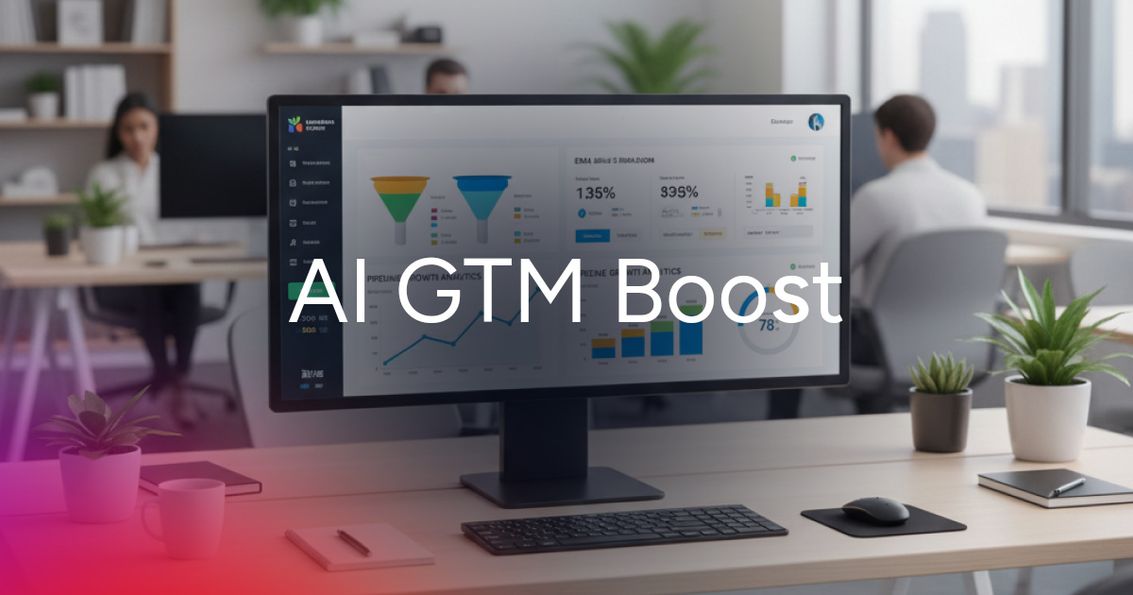What Is Go-to-Market Modeling?
Go-to-market modeling is how you decide which accounts to target, when to reach out, and where to spend your budget. It's a predictive framework that turns business data into decisions about resource allocation across sales and marketing.
The model starts with your total addressable market, which is every company that could potentially buy from you. You narrow that down to your ideal customer profile, the specific accounts most likely to convert and stay. From there, you segment by industry, company size, technology usage, or buying behavior.
Account scoring assigns values to prospects based on fit and buying signals. Pipeline forecasting predicts future revenue using historical conversion data. Territory planning maps accounts to reps based on geography or expertise. Each piece needs accurate data to work.
Why Clean Data Is the Foundation of GTM Success
Your GTM model only works if the data feeding it is accurate. Bad data breaks everything downstream.
Duplicate records make your market look bigger than it is. Outdated contacts mean your reps waste time calling disconnected numbers and emailing people who changed jobs months ago. Missing firmographic data prevents proper segmentation. Inconsistent formatting breaks automation rules in your CRM.
Here's what happens when data quality fails:
Wasted outreach:
Reps spend hours on contacts who aren't there anymore
Blown budgets:
Marketing targets accounts that don't match your ICP because the company data is wrong
Territory conflicts:
Duplicate records create ownership fights between sales reps
Bad forecasts:
Inflated pipeline numbers based on phantom opportunities
Data decays naturally. People change jobs. Companies get acquired. Phone numbers disconnect. Without continuous verification and enrichment, your model degrades every month. You need ongoing data hygiene, not a one-time cleanup.
How AI Transforms GTM Modeling
AI turns static models into systems that actually predict what's going to happen. Traditional GTM modeling relies on manual filters and gut calls. AI analyzes patterns across thousands of data points to identify which accounts will actually convert.
It processes signals humans can't track at scale. It spots correlations between company attributes, engagement behavior, and closed deals. It monitors buying signals in real time and adjusts priorities automatically.
But AI needs clean data to function. Feed it garbage and it amplifies your problems instead of fixing them.
Predictive Account Scoring
AI looks at your historical wins and losses to find patterns. It identifies which firmographic traits, technology stacks, and engagement behaviors show up in successful deals. Each account gets a score predicting conversion likelihood.
This beats manual scoring that uses basic filters like company size. AI weighs dozens of variables at once and updates scores as new data arrives. When a company hires a VP of Sales, the score changes immediately. When an account shows intent signals, it moves up the priority list.
Intent Signal Processing
AI aggregates buyer intent data from content downloads, search behavior, and competitive research. It identifies accounts actively evaluating solutions in your category right now.
The system tracks anonymous website visitors, review site activity, and third-party research behavior. It clusters signals by topic and buying stage. When multiple people from the same company show intent, AI flags the buying committee and triggers outreach.
Dynamic Segmentation and Personalization
AI refines audience segments based on real-time behavior instead of static lists. It creates micro-segments of accounts with similar traits and engagement patterns.
Traditional segmentation locks accounts into fixed categories. AI adapts as accounts move through buying stages or show new interests. An account tagged as early stage gets re-segmented when intent spikes. Your messaging adjusts automatically.
Key Components of an AI-Optimized GTM Model
You need specific inputs and processes to make AI-driven GTM modeling work. Missing any piece weakens the system.
Component | Purpose | Data Requirement |
|---|---|---|
ICP Definition | Identifies target account characteristics | Firmographic, technographic, historical win data |
Account Scoring Model | Prioritizes accounts by fit and intent | Engagement data, intent signals, CRM activity |
Territory Mapping | Aligns resources to opportunity | Geographic, industry, and company size data |
Pipeline Forecasting | Predicts revenue outcomes | Stage velocity, conversion rates, deal attributes |
Signal Monitoring | Triggers timely outreach | Real-time intent, job changes, funding events |
Your ICP needs to be data-backed, not based on assumptions. Look at which firmographic and technographic attributes appear most in closed deals. Company size and industry matter, but so do growth indicators like recent funding or hiring velocity.
Account scoring combines fit and intent. Fit measures how closely an account matches your ICP. Intent measures buying signals and engagement. Both matter because a perfect-fit account with zero intent shouldn't get the same priority as a good-fit account actively researching solutions.
Territory mapping puts the right reps on the right accounts. Poor territory design creates coverage gaps or rep conflicts. AI optimizes territories based on account potential, rep capacity, and historical performance.
Pipeline forecasting uses stage velocity and conversion rates to predict revenue. AI learns from historical deal progression to forecast close dates and win probability. This beats static forecasting that assumes every deal moves at the same pace.
Signal monitoring watches for trigger events indicating buying readiness. Job changes, funding announcements, technology purchases, and competitive evaluations all signal opportunity. AI processes these in real time and routes alerts to the right reps.
How to Scale Marketing With AI and Clean Data
You need to follow a specific sequence when implementing AI-driven GTM modeling. Skip steps and the model fails. Rush deployment before fixing data quality and you amplify existing problems.
Audit and Cleanse Your Data Foundation
Start by checking data quality across your CRM and marketing automation platform. Find the gaps, duplicates, and outdated records. This shows you how much work needs to happen before deploying AI.
Run these checks:
Contact accuracy:
Test email deliverability and phone connectivity across a sample
Firmographic completeness:
Calculate what percentage of accounts have company size, industry, and revenue data
Record hygiene:
Find duplicate accounts and orphaned contacts that need merging
Field standardization:
Look for inconsistent values in key fields like industry or company size
Set up ongoing enrichment to maintain quality. One-time cleanups don't work because data decays continuously. Build automated workflows that fill gaps and verify contacts on a regular schedule.
Define Your Ideal Customer Profile With Data
Build your ICP using historical performance data, not opinions. Analyze closed-won deals from the past 12 to 24 months. Look for patterns in firmographics, technographics, and deal characteristics.
Calculate win rates by company size, industry, and technology stack. Measure average deal size and sales cycle length across segments. Find which attributes correlate with faster closes and higher customer lifetime value.
Compare your current pipeline to your ICP definition. How many active opportunities actually match your ideal profile? This gap shows whether your targeting needs adjustment or your ICP needs refinement.
Deploy AI Models and Monitor Performance
Integrate AI scoring into your CRM and sales engagement platforms. Scores need to surface where reps work, not buried in separate dashboards. Set up automated workflows that route high-scoring accounts to the right sales motions.
Build feedback loops between sales outcomes and model inputs. When deals close or stall, that data should flow back to retrain the AI. Models drift as markets change. Regular recalibration keeps predictions accurate.
Test model performance through experiments. Run your AI model alongside your existing process. Compare conversion rates, pipeline velocity, and win rates. Measure whether AI-scored accounts actually perform better than manually prioritized ones.
Common Pitfalls When Building AI-Driven GTM Models
Most AI GTM initiatives fail because of preventable mistakes. Here's what breaks and how to fix it.
Training AI on dirty data: Models learn from the data you feed them. If your training data has duplicates, outdated contacts, or incomplete records, the AI inherits those problems and amplifies them. Fix it by completing data cleansing before model training, not after deployment.
Over-relying on firmographics: Company size and industry matter, but behavioral signals predict buying readiness better. Models that ignore intent data and engagement patterns miss accounts in active buying cycles. Fix it by layering intent signals and engagement data into your scoring model alongside firmographic fit.
Set-and-forget deployment: Markets shift, buyer behavior changes, and your product evolves. AI models trained on last year's data degrade as conditions change. Fix it by scheduling quarterly model recalibration and monitoring prediction accuracy monthly.
Ignoring sales feedback: Reps spot signal quality issues faster than dashboards. When they consistently deprioritize high-scoring accounts, your model has a problem. Fix it by building structured feedback mechanisms where reps can flag bad scores and surface patterns.
How ZoomInfo Powers AI-Optimized GTM Modeling
ZoomInfo delivers the verified data and AI your GTM model needs to actually work at scale. The platform delivers continuously verified B2B contact and company data that reduces CRM decay and improves model accuracy.
Real-time intent signals identify accounts in active buying cycles before competitors reach them. You see which companies are researching solutions in your category right now, not last quarter.
GTM Workspace with CoPilot shows you what matters right where you work. The system recommends next actions, automates routine tasks, and guides reps to high-value activities. CoPilot processes buying signals, engagement patterns, and account fit to prioritize outreach in real time.
GTM Studio lets you build custom orchestration of data and workflows at scale. You can automate plays that trigger based on specific account behaviors or signal combinations. Route accounts through different sales motions based on AI scoring and intent levels.
Key capabilities that power your GTM model:
Continuously verified B2B data:
Automated verification maintains contact accuracy and reduces bounce rates
Real-time intent signals:
Topic-level surge data shows which accounts are actively researching solutions
CoPilot AI:
Surfaces insights and next-best-action recommendations without requiring reps to leave their workflow
GTM Studio:
Lets revenue teams build custom orchestration logic connecting data, signals, and engagement at scale
Frequently Asked Questions
What role does a GTM strategist play in implementing AI for go-to-market modeling?
A GTM strategist defines business objectives, selects target segments, and ensures AI models align with revenue goals. They translate data science outputs into execution plans that sales and marketing teams can actually use.
How does poor data quality impact AI-powered go-to-market models?
Poor data quality causes AI models to generate inaccurate scores, misidentify high-value accounts, and trigger poorly timed outreach. You waste sales cycles, burn marketing budget, and miss pipeline opportunities because the model learned from bad inputs.
Can small revenue teams benefit from AI-driven GTM modeling?
Yes, AI-driven modeling helps smaller teams focus limited resources on the highest-potential accounts instead of spreading effort across unqualified prospects. Start with clean, accurate data as the foundation before deploying any AI capabilities.
What data sources should feed an AI go-to-market model?
Your AI model needs firmographic data like company size and industry, technographic data showing technology stack, intent signals indicating active research, engagement data from your CRM and marketing automation, and historical win/loss data to identify patterns. Each source adds a dimension that improves prediction accuracy.
How often should you retrain AI models used in go-to-market strategy?
Retrain your AI models quarterly at minimum to account for market shifts, product changes, and evolving buyer behavior. Monitor prediction accuracy monthly to catch drift early. When you see conversion rates diverging from model predictions, trigger an immediate recalibration cycle.


